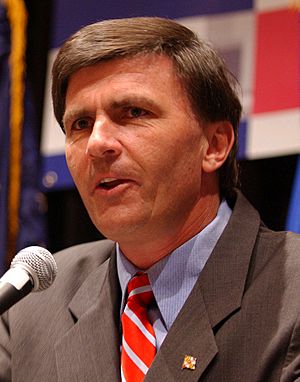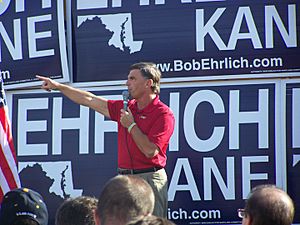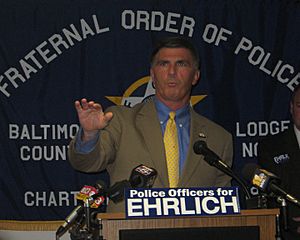Bob Ehrlich facts for kids
Quick facts for kids
Bob Ehrlich
|
|
|---|---|
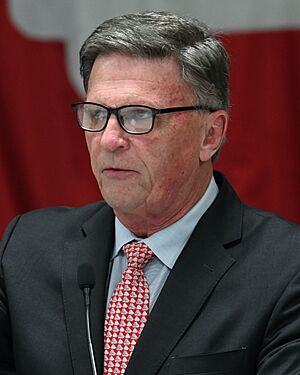
Ehrlich in 2024
|
|
| 60th Governor of Maryland | |
| In office January 15, 2003 – January 17, 2007 |
|
| Lieutenant | Michael Steele |
| Preceded by | Parris Glendening |
| Succeeded by | Martin O'Malley |
| Member of the U.S. House of Representatives from Maryland's 2nd district |
|
| In office January 3, 1995 – January 3, 2003 |
|
| Preceded by | Helen Bentley |
| Succeeded by | Dutch Ruppersberger |
| Member of the Maryland House of Delegates from the 10th district |
|
| In office January 14, 1987 – January 11, 1995 Serving with Wade Kach, Ellen Sauerbrey
|
|
| Preceded by | Thomas W. Chamberlain, Sr. |
| Succeeded by | Emmett C. Burns Jr. Shirley Nathan-Pulliam Joan Neverdon Parker |
| Personal details | |
| Born |
Robert Leroy Ehrlich Jr.
November 25, 1957 Arbutus, Maryland, U.S. |
| Political party | Republican |
| Spouse |
Kendel Sibiski
(m. 1993) |
| Children | 2 |
| Education | Princeton University (BA) Wake Forest University (JD) |
| Signature | |
| Website | Official website (archived): https://web.archive.org/web/20111213155622/http://www.bobehrlich.com/ |
Robert Leroy Ehrlich Jr. (born November 25, 1957) is an American lawyer and politician. He served as the 60th governor of Maryland from 2003 to 2007.
Ehrlich is a member of the Republican Party. Before becoming governor, he represented parts of Baltimore County in the Maryland House of Delegates from 1987 to 1995. He then served in the United States House of Representatives for Maryland's 2nd Congressional district from 1995 to 2003.
He was the first Republican to be governor of Maryland since Spiro Agnew in 1969. After one term, he lost his re-election bid in 2006 to Democrat Martin O'Malley. Ehrlich ran against O'Malley again in 2010 but was not successful.
Contents
Early Life and Education
Robert Ehrlich was born in Arbutus, Maryland, a suburb of Baltimore. His mother, Nancy, worked as a legal secretary, and his father, Robert Sr., was a car salesman.
He went to Gilman School and then to Princeton University on a scholarship. At Princeton, he was the captain of the football team. He earned a degree in politics in 1979. Later, he studied law at Wake Forest University School of Law and graduated in 1982.
After law school, Ehrlich worked at a law firm in Baltimore. He became involved in politics and was elected to the Maryland House of Delegates in 1986. He represented parts of Baltimore County until 1995.
Family Life
Robert Ehrlich married Kendel Sibiski in 1993. They have two sons named Drew Robert and Joshua Taylor.
Serving in the U.S. House of Representatives (1995–2003)
In 1993, the Representative for Maryland's 2nd district, Helen Delich Bentley, decided not to run again. Robert Ehrlich ran for this open seat and won the election in November 1994.
While in Congress, he worked on laws to help people with disabilities keep their jobs. He also supported stronger punishments for gun violence. Ehrlich was part of the U.S. House Energy and Commerce Committee. He also served on subcommittees dealing with health, telecommunications, and the environment.
Ehrlich won all his elections for Congress by large margins. In 2002, he decided not to run for Congress again. Instead, he chose to run for governor. Dutch Ruppersberger, a Democrat, took his place in Congress.
Running for Governor in 2002
In 2002, the Democratic Governor Parris Glendening was finishing his second term. Some people in Maryland were unhappy with the state's budget problems and certain environmental rules.
On March 15, 2002, Robert Ehrlich announced he was running for governor. He criticized the current governor's record and linked his Democratic opponent, Lt. Gov. Kathleen Kennedy Townsend, to those issues. Ehrlich promised to increase school funding, balance the state budget, and protect the Chesapeake Bay. His running mate was Michael Steele, who was the head of the Maryland Republican Party.
During the election, Townsend faced criticism for her choice of running mate. Her campaign also struggled because the outgoing governor was not very popular. Even though Maryland usually votes for Democrats and had not elected a Republican governor in almost 40 years, Ehrlich won the election. He received 52% of the votes, while Townsend received 48%. He became the sixth Republican governor in Maryland's history.
Governor of Maryland (2003–2007)
As governor, Robert Ehrlich focused on five main areas: managing the state's money wisely, improving education, health, and the environment, ensuring public safety, and boosting business. He did not support increasing sales or income taxes. He supported allowing slot machines to help raise money for the state.
During his time as governor, Maryland's unemployment rate was lower than the national average. It dropped from 4.5% in 2003 to 3.9% in 2006. The state added 98,000 private sector jobs.
Ehrlich created a special Department of Disabilities within his government. This was the first time a state had a cabinet-level agency specifically for people with disabilities.
In 2004, Governor Ehrlich signed the Chesapeake Bay Restoration Act. This law helps pay for upgrades to water treatment plants to reduce pollution flowing into the Chesapeake Bay. It adds a small fee to business and home water bills to fund these improvements. This law was a big step towards cleaning up the Bay.
In 2006, Ehrlich signed a law that stopped police from having quotas for traffic tickets.
The "Wal-Mart" Health Care Bill
In January 2006, Governor Ehrlich vetoed a bill called the "Fair Share Health Care Bill." This bill would have required large companies with more than 10,000 employees in Maryland to spend a certain amount of money on employee health care. If they didn't, they would have to pay that amount to a state health program. The bill was often called the "Walmart Bill" because Walmart was the only company of that size in Maryland that didn't already meet the spending requirement.
Ehrlich vetoed the bill because he believed it went against federal law. He also said it would hurt businesses and consumers. However, the Democratic lawmakers in Maryland passed the bill anyway, overriding his veto. Later, in July 2006, a federal court judge ruled that the Maryland law was illegal because it violated a federal law about employee benefits.
2006 and 2010 Gubernatorial Elections
In 2006, Governor Ehrlich ran for a second term. He did not have any opponents in the Republican primary election. However, on November 7, 2006, he lost the general election to Baltimore Mayor Martin O'Malley. O'Malley won with 53% of the votes, while Ehrlich received 46%. Ehrlich's term as governor ended on January 17, 2007.
After Leaving Office
After leaving public office, Ehrlich and some of his former staff opened an office for a law firm in the Baltimore area. His wife, Kendel, took a job as a director at BankAnnapolis.
From 2007 to 2010, Ehrlich and his wife hosted their own radio show on WBAL-AM Radio. He also often gave guest lectures at Towson University.
Running Again in 2010
On March 30, 2010, Robert Ehrlich announced he would challenge Governor Martin O'Malley again. His running mate was Mary Kane, who had served as Maryland's Secretary of State under Governor Ehrlich. He easily won the Republican primary election.
Several well-known Republicans supported Ehrlich's campaign, including former Massachusetts Governor Mitt Romney and former New York City Mayor Rudy Giuliani. However, in the general election, Ehrlich lost to O'Malley again. O'Malley won with 56% of the votes, and Ehrlich received 42%.
Support for Presidential Candidates
In October 2011, Robert Ehrlich was chosen to lead Mitt Romney's campaign in Maryland for the 2012 presidential election.
In the 2016 presidential primaries, Ehrlich first supported John Kasich. Later, in May 2016, he endorsed the Republican nominee, Donald Trump.
After Politics
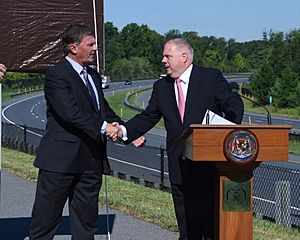
As of December 2020, Robert Ehrlich works as a senior counsel at King & Spalding, a large law firm in Washington. He is part of their team that works on government advocacy and public policy.
In August 2022, the Maryland Republican Party announced that Ehrlich would lead their "2022 Victory Campaign." This campaign aimed to support the party's candidates in the elections that year. However, the Republican candidates he supported lost by a large margin to Democratic candidates Wes Moore and Anthony Brown in November 2022.
Images for kids
See also
 In Spanish: Robert Ehrlich para niños
In Spanish: Robert Ehrlich para niños
 | Claudette Colvin |
 | Myrlie Evers-Williams |
 | Alberta Odell Jones |



